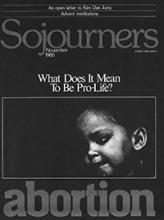As President of Right to Life of Michigan and now vice president of National Right to Life, I am often asked by those outside the movement whether my involvement in the abortion issue was primarily motivated by religious conviction. They always seem somewhat disappointed when I point out that in fact religious conviction by itself initially kept me from becoming actively involved in the abortion issue. I was naturally horrified by abortion statistics, but like many of my contemporaries in the late '60s, I erroneously felt that I could not impose my sectarian morality upon a pluralistic society.
Then a young philosophy professor pointed out to me that involvement in the abortion issue was imperative for the same reasons that I felt it necessary to become involved in the civil rights issue--like the blacks, another group of human beings, the unborn, were being violently discriminated against. The realization that abortion is a form of discrimination of the most violent sort made it less plausible for me to say, "It's a private moral question," or "I would not have an abortion, but..." This kind of objection arose because I was connecting abortions with sexual ethics, which is a private moral matter in a way that violence and discrimination are not. Prejudice is the most common feature of injustice. The kind of prejudice here is not so much an explicit rejection of someone, but a failure of imagination--a failure to identify with the person whose rights we are violating.
This whole problem of a prejudicial lack of imagination is very much a problem in the case of abortion: We don't see "fetuses"; we don't identify with them. We can't remember what it was like when we were small and defenseless unborn children.
Jane Muldoon lived in Grand Rapids, Michigan, when this article appeared.
Read the Full Article

